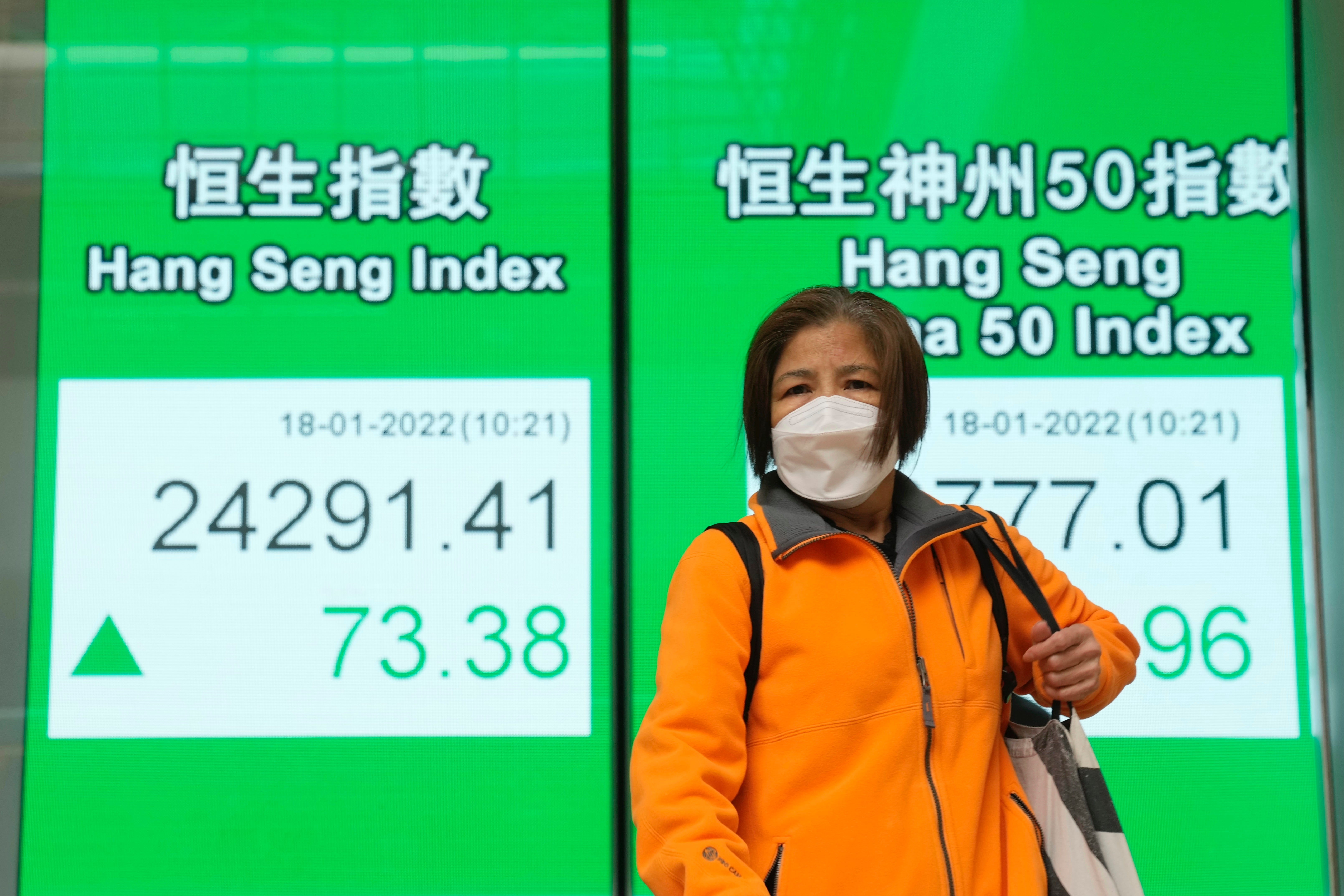Asia shares mostly lower as investors mull likely rate hike
Asian shares are mostly lower while oil prices surged following an attack on an oil facility in the capital of the United Arab Emirates

Your support helps us to tell the story
From reproductive rights to climate change to Big Tech, The Independent is on the ground when the story is developing. Whether it's investigating the financials of Elon Musk's pro-Trump PAC or producing our latest documentary, 'The A Word', which shines a light on the American women fighting for reproductive rights, we know how important it is to parse out the facts from the messaging.
At such a critical moment in US history, we need reporters on the ground. Your donation allows us to keep sending journalists to speak to both sides of the story.
The Independent is trusted by Americans across the entire political spectrum. And unlike many other quality news outlets, we choose not to lock Americans out of our reporting and analysis with paywalls. We believe quality journalism should be available to everyone, paid for by those who can afford it.
Your support makes all the difference.Asian shares were mostly lower Tuesday following a national holiday in the U.S, while oil prices surged following an attack on an oil facility in the capital of the United Arab Emirates that killed at least three people.
Benchmark U.S. crude rose $1.53, or 1.8%, to $85.35 a barrel in electronic trading on the New York Mercantile Exchange. It gained $1.70 to $83.82 per barrel on Monday.
Brent crude the basis for pricing international oil, added $1.20 to $87.68 a barrel.
Satellite photos obtained by The Associated Press on Tuesday appeared to show the aftermath of the attack, which was claimed by Yemen’s Houthi rebels.
Share benchmarks fell in Hong Kong Tokyo Seoul and Sydney but rose in Shanghai. U.S. futures declined, while the yield on the 2-year Treasury rose above 1%, adding to expectations the Federal Reserve will soon raise rates to counter inflation.
The Bank of Japan wrapped up a two-day policy meeting with no major changes. Its benchmark interest rate remains at a longstanding minus 0.1%.
The super-easy monetary policy of the Japanese central bank is expected to stay unchanged for the time being, as the nation grapples with surging cases of COVID infections set off by the omicron variant.
The recent sudden increase in reported cases is likely to crimp economic activity. Japan, which has not had any pandemic lockdowns, has gone through periods of restrictions to curb the spread of COVID-19, mostly having restaurants and bars close early. Such restrictions are expected to expand this week to about a third of the nation, including Tokyo.
Japan’s benchmark Nikkei 225 fell 0.3% to 28,257.25. Australia’s S&P/ASX 200 lost 0.1% to 7,408.80. South Korea’s Kospi dropped 0.9% to 2,864.24. Hong Kong’s Hang Seng slipped 0.6% to 24,061.46, while the Shanghai Composite rose 0.8% to 3,569.91.
Signs of inflation are also worrying policy makers. Price increases in Japan have been less pronounced than it is in the U.S. and some other nations, though the central bank raised its inflation forecast for the fiscal year that begins in April to 1.1% from a previous estimate of 0.9%.
Worries are high that rising COVID cases may hurt manufacturing in Asian nations, especially China.
Earlier this week, China reported its economy expanded at an 8.1% annual pace in 2021 but slowed sharply in the last quarter. The weakness in China's economy toward the end of 2021 has set off suggestions Beijing should prop up growth with interest rate cuts or public works spending.
“Overall sentiments may still lean towards some cautiousness, as some market participants may refrain from taking on more risks. This comes amid a quiet U.S. calendar ahead and the absence of comments from Fed officials going into the FOMC meeting next week,” said Yeap Jun Rong, market strategist at IG in Singapore.
Rising bond yields tend to put pressure on stocks, as investors reassess their asset allocations and take a closer look at share prices, especially higher valued ones.
The yield on the 10-year Treasury was at 1.83% on Tuesday, also having risen in recent days.
In currency trading, the U.S. dollar rose to 114.88 Japanese yen from 114.62 yen. The euro cost $1.1397, down from $1.1410.
___
Yuri Kageyama is on Twitter https://twitter.com/yurikageyama